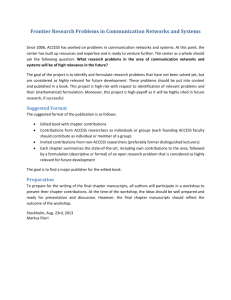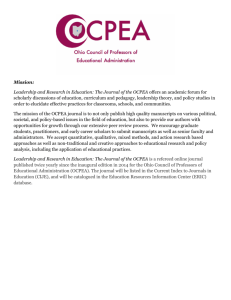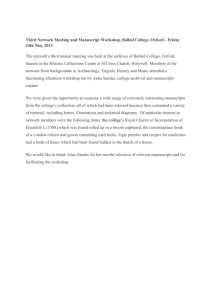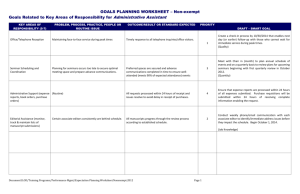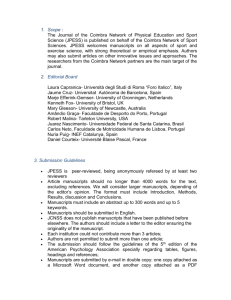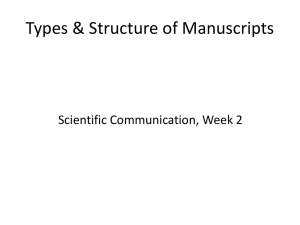Report to Board Family Process Jay Lebow: Editor October 2, 2015
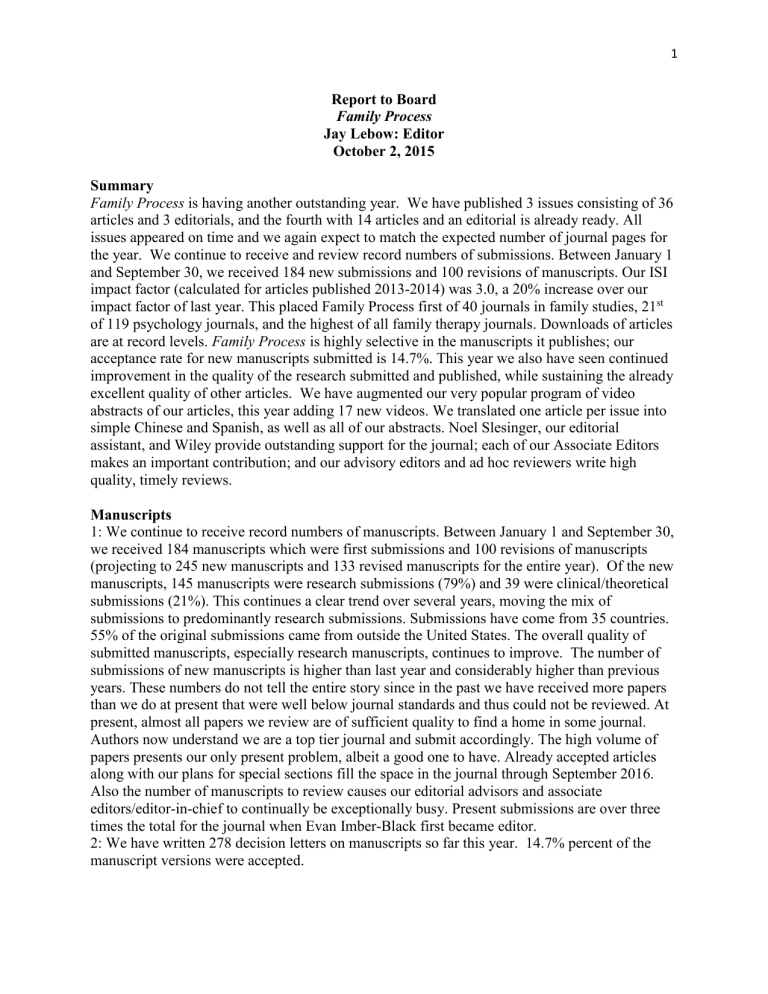
1
Report to Board
Family Process
Jay Lebow: Editor
October 2, 2015
Summary
Family Process is having another outstanding year. We have published 3 issues consisting of 36 articles and 3 editorials, and the fourth with 14 articles and an editorial is already ready. All issues appeared on time and we again expect to match the expected number of journal pages for the year. We continue to receive and review record numbers of submissions. Between January 1 and September 30, we received 184 new submissions and 100 revisions of manuscripts. Our ISI impact factor (calculated for articles published 2013-2014) was 3.0, a 20% increase over our impact factor of last year. This placed Family Process first of 40 journals in family studies, 21 st of 119 psychology journals, and the highest of all family therapy journals. Downloads of articles are at record levels. Family Process is highly selective in the manuscripts it publishes; our acceptance rate for new manuscripts submitted is 14.7%. This year we also have seen continued improvement in the quality of the research submitted and published, while sustaining the already excellent quality of other articles. We have augmented our very popular program of video abstracts of our articles, this year adding 17 new videos. We translated one article per issue into simple Chinese and Spanish, as well as all of our abstracts. Noel Slesinger, our editorial assistant, and Wiley provide outstanding support for the journal; each of our Associate Editors makes an important contribution; and our advisory editors and ad hoc reviewers write high quality, timely reviews.
Manuscripts
1: We continue to receive record numbers of manuscripts. Between January 1 and September 30, we received 184 manuscripts which were first submissions and 100 revisions of manuscripts
(projecting to 245 new manuscripts and 133 revised manuscripts for the entire year). Of the new manuscripts, 145 manuscripts were research submissions (79%) and 39 were clinical/theoretical submissions (21%). This continues a clear trend over several years, moving the mix of submissions to predominantly research submissions. Submissions have come from 35 countries.
55% of the original submissions came from outside the United States. The overall quality of submitted manuscripts, especially research manuscripts, continues to improve. The number of submissions of new manuscripts is higher than last year and considerably higher than previous years. These numbers do not tell the entire story since in the past we have received more papers than we do at present that were well below journal standards and thus could not be reviewed. At present, almost all papers we review are of sufficient quality to find a home in some journal.
Authors now understand we are a top tier journal and submit accordingly. The high volume of papers presents our only present problem, albeit a good one to have. Already accepted articles along with our plans for special sections fill the space in the journal through September 2016.
Also the number of manuscripts to review causes our editorial advisors and associate editors/editor-in-chief to continually be exceptionally busy. Present submissions are over three times the total for the journal when Evan Imber-Black first became editor.
2: We have written 278 decision letters on manuscripts so far this year. 14.7% percent of the manuscript versions were accepted.
2
3: We have published 3 issues this year consisting of 36 articles and 3 editorials and the fourth is set. The March issue included a special section focused on relational processes edited by
Marianne Wamboldt that included papers for which Marianne Wamboldt, Amy Slep, Heather
Foran, and Richard Heyman were first authors. The June issue included a special section on
Mexican origin U.S. families edited by Michael Rohrbaugh. The September issue features a special section focused on LGBTQ families edited by Robert-Jay Green as well as articles about the family progress measures SCORE and STIC. The December issue will include a special section focused on co-parenting edited by James McHale and Carla Stover as well as an interesting exchange about marital enrichment programs involving Alan Hawkins and Howard
Markman. We also currently have 40 articles in Early View awaiting a place in the paper journal and 9 others accepted but awaiting Early View updates. We have 64 manuscripts presently under review and have in addition a number of papers for which we have sent a decision letter asking for a revision but have not yet received the revision.
4- Given all the submissions we have received, our Editorial Advisors continue to be very busy
(there are 3 reviews per paper so at any given time there are typically about 100 reviewers in the process of assessing manuscripts). Almost universally, the Editorial Advisors and Board of
Directors have been willing to review manuscripts when asked and have produced timely and thoughtful reviews. Our mean time from submission to decision for manuscripts submitted this year is 29 days, an excellent turnaround time. We also have been working to assure that all reviews are thorough, informative, and on time.
5-I have appointed 12 new advisory editors this year. Almost all have been individuals who are very knowledgeable about research methods, because we needed more reviewers for our many research papers, which now number 4/5 of our submissions. We will continue our policy of rotating some members off the editorial board to make additional room for new members. At the end of 2014, 10 advisory editors rotated off. We have also had reviews from 83 ad hoc reviewers, many of whom are among the most prominent scholars in their fields and others who are emerging voices. I have been pleased by the willingness of scholars to devote time to Family
Process even when they are not editorial advisors.
5- We have published four new virtual issues, one focused on underserved populations (edited by
Eli Karam), one on couple therapy (edited with the help of MFT students Christie Stiff and Jason
Peruchini), one on training resources targeted at international programs (edited by Janine
Roberts) and the other on LBGTQ families (edited with the help of MFT student Casey
Gamboni). We plan to have additional topic-centered virtual issues in the future-one drawing from Family Process treasure trove of articles on epistemology and family therapy.
6-This year we published 4 special sections. They focused on: relational diagnosis edited by
Marianne Wamboldt; Mexican American families edited by Michael Rohrbaugh; LGBTQ families edited by Robert Jay Green; and co-parenting edited by James McHale and Carla
Stover. For 2016 we have special sections planned focused on narrative therapy edited by Vicki
Dickerson, family resilience edited by Froma Walsh, and the research about evidence-based approaches to family therapy that I will edit.
Domains of the Associate Editors
1- Catherine Stroud, Vicki Dickerson, Janine Roberts, and Michael Rohrbaugh have been very active as associate editors.
2- Vicki Dickerson, our associate editor for technology and new media, has continued to lead many innovations in new media.
3
A: We added 17 new video abstracts. We have now on the Wiley online library 77 video abstracts, 1 podcast, and 1 interview. The 17 new video abstracts have had a total of 2,635 views. We also have 159 subscribers to our YouTube channel. The main Wiley Online Library page highlights these new media materials and now adds the video abstracts to the online table of contents page as well. With video abstracts becoming part of our normal operation, we have been able to plan for and solicit video abstracts well in advance. Our early adoption of these technologies has had considerable impact and continues to add to the view of Family Process as being on the cutting edge. John Lawless has been enormously helpful in working to keep the new familyprocess.org page current with all these new developments and consistent with the Wiley
Online Library pages.
B: We also have had a very active Twitter feed in place as well as a Facebook page, disseminating information about Family Process and our articles. On average, 3-4 tweets per day have been created by Vicki Dickerson and our MFT student assistant, Casey Gamboni. In total, there have been 1,092 tweets this year on Twitter. We have 1,608 “followers” on Twitter and are “following” 1,114 others. 14 people have “liked” us on Facebook (meaning they have linked to us). Our goal in relation to Twitter and Facebook is primarily to engage the next generation with the work of Family Process . Wiley also now presents us with metrics tracking such activity.
C. We continue to have a Wikipedia page that fully meets Wikipedia criteria and presents Family
Process as a unique resource to the world. We are in the process of updating our Wikipedia page to reflect all of our recent activity.
3-Janine Roberts, our associate editor for international scholarship, has been working directly with our translations of one article per issue into simple Chinese. We continue to present abstracts of all of our articles in Spanish and simple Chinese online, and continue to work with the Chilean Family Institute for one article per issue to be translated into Spanish. We also on a one time basis translated three articles this year into Arabic. All these resources are available on the Wiley journal website. These programs exemplify
Family Process’
commitment to being an international journal, and they continue to remarkably operate on schedule despite the complex tasks and problems that accompany working in multiple languages at great distance.
4-Michael Rohrbaugh and Catherine Stroud, as associate editors for research, continue to pursue conversations with prominent researchers about submitting to the journal. These have resulted in submissions from several well-known authors who would not otherwise have submitted to
Family Process . We also have solidified a set of advisory editors and other reviewers up to the task of reviewing the methodologically sophisticated papers we now receive. In tandem with this, we have lengthened the typical review process for research papers by asking for additional revisions. These changes have improved the quality of the papers published. Michael has also generously devoted a considerable amount of time to respond respectfully and helpfully to international authors of research papers with problematic research method sections. Although these submissions are almost always rejected, this feedback is much different in voice from that of a typical American research journal when such papers are encountered; remaining positive and constructive about ways the research can further develop. Michael also has taken prime responsibility for the special section in the June issue on research on Mexican-American families. In her first year as associate editor, Catherine Stroud has specialized in reviewing our more complex research papers and done a superb job in this regard.
4
Journal Infrastructure
1-In 2012-2014, we reworked much of the infrastructure of the journal such as the instructions to authors, letters to reviewers, etc. This year we have only made minor changes where needed.
A.
We have updated and made much more rigorous our procedure and requirements for authors to divulge conflicts of interest. All authors submitting must now respond to a clear statement about what we regard as conflict of interest and a comprehensive set of questions about potential conflicts of interest in their submissions. We also have attended to conflicts of interest among reviewers in the reviewer process. I wrote an editorial about such conflicts of interest that appears in the June issue.
B.
In 2013 Family Process added approximately 20% more pages than in the previous year and with the changes in font we instituted at the end of 2012, we continue to publish 10 more articles per year than we did before 2012. We clearly have more than ample high quality manuscripts to publish this number of manuscripts a year.
C.
The process for inviting reviewers we instituted in 2012 remains quite successful. In
2012, we changed the method for inviting reviewers to review manuscripts from a onestep process in which reviewers were simply assigned manuscripts with no feedback about whether they accepted the assignment to a more state of the art system in which an email is sent inviting the reviewer to review the manuscript requesting a response, followed up by assignment to the manuscript if the reviewer agrees. This has provided us better information about who will review various manuscripts as well as providing the reviewer with more of a sense of control over the process. This system has functioned smoothly and has achieved our goals of enabling a more collaborative process with reviewers and a more predictable sense in our office about the flow of reviews.
D.
We moved to Early View for our articles in the middle of 2012. Once articles are accepted, they immediately enter a queue for publication online. This change is now fully incorporated into our plans and has been quite successful, providing quick access for readers to the latest material. As a practical matter this means that most of our articles are published online within a few weeks after acceptance. This allows rapid access to our newest articles, as well as permitting authors to record articles as publications soon after acceptance; this especially has meaning for authors in university settings. Articles are then later compiled into issues of the journal based on their date of submission and topic.
Combining the impact of Early View and the additional articles we publish per year, online publication now is typically within two months of acceptance. However, our lag to the appearance of articles in a printed journal issue is increasing; now numbering close to one year for most articles.
E.
Our MFT students continue to bring up-to-date the index of themes in Family Process.
This index now is updated each year and appears on the Wiley website.
F.
We have made a special effort to update and coordinate all lists of addresses and emails for our advisory editors and reviewers, on all the various sites and with Wiley, so all information is current and consistent.
2. We are promoting our published articles as well as encouraging authors to submit to Family
Process in many places, as well as online. This year I attended annual meetings of the American
Family Therapy Academy, the American Psychological Association, the Association for
Cognitive and Behavioral Therapies and several other local meetings. Our associate editors
5 attended additional meetings. This presence allows Family Process to be more frequently considered in the increasingly wide world of family therapy and family science. Extending into this range of communities of scholars, trainers, and practitioners is an extension of my vision of
Family Process, speaking to the diverse constituencies in family therapy and family science, and becoming one place that these communities might find common ground. AT AFTA, I along with the editors of several other family therapy journals including JMFT offered a workshop in publication in family therapy journals.
Janine Roberts and I have been working on and following through with a number of plans for cooperation between international journals. I also hosted a meeting for our editorial advisors at AFTA.
3-Our ISI journal citation reports impact factor for 2014 (our current impact factor) was 3.00.
This is a 20% increase over the previous year. This placed us first out of 40 journals in family studies and 21 out of 119 in Clinical Psychology. To put this in context, this is an ISI higher than every other family therapy journal. It also represents a vast increase over the impact factor of .92 in 2004 when Evan Imber-Black became editor. One result of this impact factor has been more attention to the journal and a further increase in the number and quality of submissions we receive. Wiley uses our impact factor as part of their advertisement for their entire group of social science journals. We continue to seek to attend to and keep our impact factor steady at this level, though the influence of Family Process is only imperfectly marked by this measure given the importance of books and book chapters (which are not counted in assessing the impact factor) in the clinical and theoretical side of our field (causing the impact factor to underrepresent Family Process’ influence). We also continually actively seek to publish important articles (such as many of those with a clinical focus) that are unlikely to be widely cited and which thus will negatively affect our impact factor.
4-Noel Slesinger is doing a superb job as the editorial assistant for the journal. In addition to providing support for all the activities mentioned in this report, Noel has assembled flow charts for the flow of manuscripts and our other activities to simplify and promote standardization and being able to communicate understanding of these processes. Noel entered a PhD program in clinical psychology in September, but will continue as our editorial assistant. Casey Gamboni,
Christie Stiff, and Jason Peruchini, our MFT students, have also contributed significantly in helping develop our videos, writing and sending tweets and Facebook posts, and compiling the virtual issues and the theme index for the journal and also have been helpful in the creation of several of our virtual issues. Noel has also contributed Spanish translations of tweets for a
Spanish feed and edited several manuscripts written by authors for whom English is a foreign language.
5-The Family Institute at Northwestern has also been enormously supportive in numerous ways.
As well as housing our activities, it employed Noel full-time until September 1 when she began graduate school. The Family Institute also generously assigns assistants from its MFT program to
Family Process .
5-The team from Wiley continues to provide excellent support for the journal. Jieying Lee has provided excellent support in the production of issues. Margaret Zusky and Julia Bond also have been attentive to our needs.
6-The Board of Directors of Family Process Institute and its President Marianne Wamboldt have also been incredibly supportive of the journal. The board has created a financially stable environment for the journal that encourages expansive ideas. It also has financially underwritten the initiatives to translate four articles per year into simple Chinese and Spanish and to expand the pages of the journal.
6
Projected Developments
1.
The number of fine manuscripts we receive has resulted in more accepted manuscripts, leading to the emergence of lag to publication in the print journal as an ongoing problem. Beyond the increasing number of manuscripts we receive, the majority are now high quality. One marker of the increase in quality of submissions is that there are many papers, which are part of a series, for which earlier papers were accepted, whereas later papers in the series now are rejected. In terms of processing manuscripts, adding to our advisory editors and the addition of new associate editors has helped. and, thus, our review process continues to work well and remain timely. Also, early view has allowed Family Process, like many other publications, to have longer pending lists of publications (since the articles are in fact “published” at the point of entering early view.) Having said that, ultimately we will need to either increase our already fairly stringent rejection rate or add more pages to the journal. For the present, we will reject a higher percentage of manuscripts.
2.
We are seguing to a new set of expectations for all associate editors: that they will take primary responsibility for some of the large number of research based manuscripts we receive. Kate
Stroud and Michael Rohrbaugh already function in this way. In the future, associate editors will not have other specific roles (e.g. international scholarship). Personnel changes are also underway. Janine Roberts will end her term as associate editor at the end of the year. Janine has done a remarkable job over 12 years as Associate Editor of International Scholarship of spearheading the translation of every article abstract and one article per issue into Simple
Chinese and Spanish; and further establishing Family Process’ identity across the World as an international journal. A proposal to have Vicki Dickerson (whose work with new media has also been groundbreaking) to continue to work with new media in a new broader role for Family
Process Institute is circulating. We hope to add a third associate editor who will focus on research manuscripts at the end of the year.
3.
We will launch further efforts to publicize the work of the journal. Some of the resources we have developed such as our virtual issues and article translations remain obscure to most. Any efforts that can help with the process of further publicizing and disseminating the journal’s work would be most welcome.
